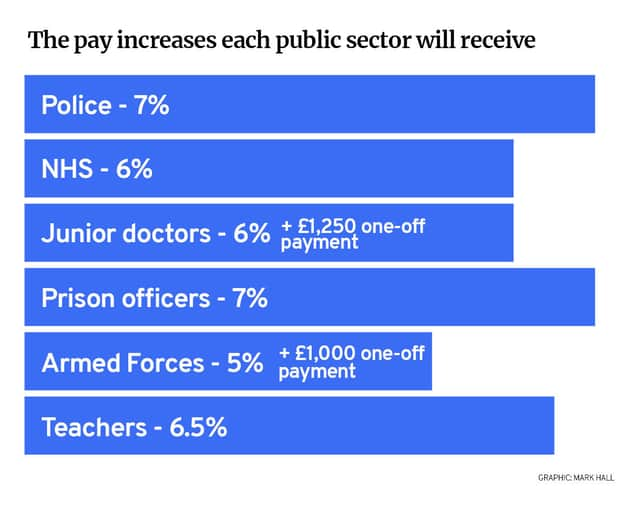Public sector pay: doctors, teachers, police and armed forces to get between 5% to 7% pay increase
and live on Freeview channel 276
Millions of public sector workers - including doctors, teachers and police officers - are to get pay increases of between 5% and 7%, the government has announced.
Prime Minister Rishi Sunak said he had accepted the recommendations of independent pay review bodies, and called on trade unions to call off strikes saying the new pay offer is final. Teachers in England walked out last week, and junior doctors began a five-day strike today over pay. The pay offers are still below inflation - which remains at 8.7%.
Advertisement
Hide AdAdvertisement
Hide Ad“Now there’s a clear message here. There are always choices. Budgets are not infinite. When some ask for higher pay, that will always create pressures elsewhere,” Sunak said in a press conference.
“It is now clear momentum across our public services is shifting. The vast majority who just want to get on with their life’s calling of serving others are now returning to work. Today’s offer is final. There will be no more talks on pay. We will not negotiate again on this year’s settlements and no amount of strikes will change our decision.”
Sunak used the press conference to demand junior doctors and consultants to end their strike action. He said: “We have plans in place to continue working on backlogs, but without the industrial action ending of course that will be more difficult.
“And that’s why I would urge consultants and junior doctors to accept the recommendations of the independent pay review body. This is not even the government, this is the independent pay review body who has made a recommendation on their pay, which we have accepted in full on top of all the other things we’ve done for the NHS, like the long-term workforce planning just the other week.
Advertisement
Hide AdAdvertisement
Hide Ad

“I would urge them to accept this offer from the independent bodies. And that way we can all work collectively together to bring the backlogs down. I know that that’s what the vast majority of them want to see happen. That’s what I want to see happen and I’m prepared to work with them to do that.”
It remains doubtful that the British Medical Association will accept this. Earlier in the week, Professor Philip Banfield, the union's council chair, told NationalWorld: "The medical profession has completely lost confidence in the independence of the pay review body. The government has persistently interfered with and undermined the process, meaning it has overseen huge and repeated real-terms cuts in doctors’ pay. We are clear that another real-terms cut this year would be completely unacceptable to our members.”
The government has said it will not borrow to fund these pay rises as that would "simply add more pressure on inflation at exactly the wrong time". Treasury minister John Glen said: "Instead, the awards will be funded through a combination of the significant provision for pay that was made at the last spending review, greater efficiency and reprioritisation. Departments will be reprioritising within existing budgets, and driving further efficiencies to focus where it delivers the greatest value."
In addition, Sunak said the pay awards would be funded by “significantly” raising fees for migrants’ visa applications and NHS access.
Advertisement
Hide AdAdvertisement
Hide AdSpeaking in the Commons, Glen gave more detail: "New teachers will start on at least £30,000, the lowest paid armed forces will see a pay rise of over £2,000 and the starting salary of a junior doctor will rise by more than £3,000, and that comes alongside our agenda for change deal which delivered a 5% pay rise along with one-off awards worth more than £3,600 for the average nurse or more than £3,700 for the average ambulance worker."
Comment Guidelines
National World encourages reader discussion on our stories. User feedback, insights and back-and-forth exchanges add a rich layer of context to reporting. Please review our Community Guidelines before commenting.
